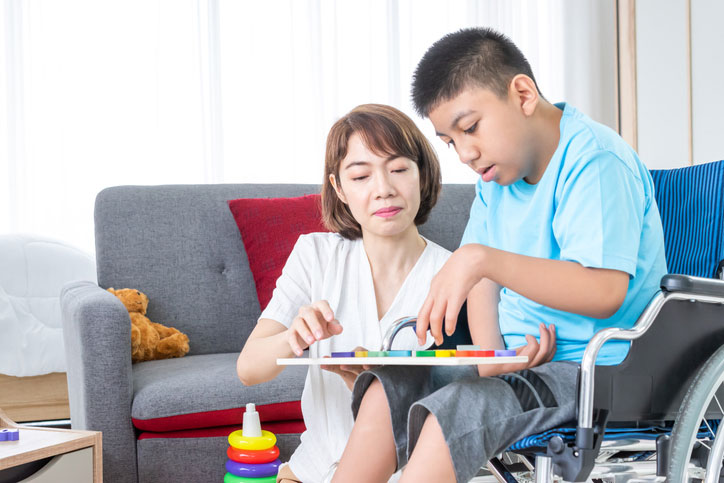Written by Scott Wilson

In their formative years, the social environment surrounding children can have an enormous impact on their long-term well-being and quality of life. New York can be the ideal place for kids—immersed in world-class culture, opportunities, and entertainment.
But not every child in New York gets all those advantages without a little assistance. Social workers in child and family welfare roles are responsible for making sure society gets it right.
These positions are a critical check on children who can slip through the cracks of family and educational structures. They have the powerful authority and the enormous responsibility that comes with being able to remove kids from dangerous situations—decisions that are not made lightly as they come with the potential to affect the rest of a child’s life.
It’s one of the social work roles that is most important in our society. It demands the kind of preparation and judgement that only come with advanced degrees in social work.
What Do Child Welfare Social Workers in New York Do?
Child welfare roles in social work can touch on just about any of the many risks the affect kids in society today. They may handle work in areas like:
- Adoption and foster care systems
- Domestic violence and child abuse support and prevention
- Juvenile justice
- Health and medical services
- Substance use disorder prevention and treatment programs
- Gender affirming care
Because children are naturally a part of a family unit, social workers in this area focus a lot on family dynamics and ensuring that parents have the resources and ability to keep their kids safe and healthy. They often work in partnership with both direct or extended family to open up access to services, offer support and counseling, or put prevention plans in place to guard against violence, malnutrition, or health problems.
Although the population focus for this role overlaps with that of school social workers and juvenile and young adult social workers, the concerns here are primarily with ensuring that kids have the necessary and appropriate protections and assistance to be safe and secure.
Workers in this field are likely to be employed by government agencies and carry the weight of that authority with them
That puts child and family social workers in a tough spot that requires special training and a delicate touch to get right. It’s not a small thing to intervene in parent and child relationships; yet it’s also unthinkable to leave kids in risky or dangerous circumstances. They also need to have the case management skills to navigate the bureaucracy of regulatory and resource structures to get clients the services they need.
Advocacy Helped Put a Strong Set of Child Protection Laws on the Books in New York, and Case Management Helps Enforce Them
These jobs can be either clinical or more on the mezzo side of social work practice. Clinically, social workers in child welfare may offer direct psychotherapy and counseling to kids and families. They may investigate sensitive allegations in ways that are least harmful to children. They can also be responsible for assessing home and social environments to determine appropriate placements for temporary foster care or adoption.
New York’s child, youth, and family social workers are critical to both sides of the child welfare system here. Not only do they get credit for helping to strengthen child protection laws over the decades, they’re also the ones out in the world giving those laws real teeth by actively serving as frontline regulators.
Child, youth, and family social workers are found at the macro side of the field, where influencing government policy and regulation can have an impact on millions of kids and families. Lobbying for reforms in New York child protection laws, increased funding for child care, or additional supports for kids transitioning out of the child welfare system are all important concerns for these social work professionals.
In mezzo work, child and youth social work roles tend more toward case management and oversight. These positions are more engaged in tracking or checking up on abuse complaints, foster care placements, or ensuring that housing and food needs are being met. In both intermediate and clinical roles, extensive documentation and accurate records are important. Regulation and ethical standards are of the highest importance in this role, and a unique level of sensitivity is required when working directly to help children and families through challenging situations. But as any child social worker will tell you, the welfare of children always comes first.
Specialized MSW Degrees in Child and Family Social Work, and Roles in New York that May Be Open with a BSW

Anyone heading for clinical social work in child, youth, and family welfare work will need to earn a Master of Social Work degree. No different from generalist social work practice or any other specialty, the MSW is the basis for becoming a licensed social worker in New York.
There are many MSW programs that offer various specializations aimed at child welfare work. They include:
- Child Welfare: Children, Youth, & Families
- Clinical Practice with Families & Children
- Family, Youth, and Children’s Services
- Child & Family Services
Although school and educational social work isn’t an exact fit for children and family services roles, concentrations in that area can overlap considerably with other youth issues.
In addition to the general comprehensive social work preparation that comes with any MSW program, you will find additional coursework available on topics like:
- Trauma-Informed Child Welfare Practice
- Policy and Practice in Child Welfare
- Women and Social Welfare Policy
- Human Development Across the Lifespan
- Family Practice in Social Work
- Human Behavior in the Social Environment
Those degrees also have a wealth of different potential practicum and internship placement options that put you in the thick of the action. The state Office of Children and Family Services typically has more than 13,000 kids in foster care and oversees dozens of boarding and group homes. NYC’s Administration for Children’s Services conducts over 50,000 investigations of neglect or abuse annually in the city alone.
Whether at one of these busy and dedicated state agencies or at a non-profit like the Child Center of NY, it’s important to get hands-on expertise as part of your education.
Kids and Their Families in New York Need Your Support at Every Level of Social Work Practice
Clinical jobs are not the only game in town when it comes to child and family social work in New York. In fact, there are plenty of case management and other positions that don’t dive into the complex psychosocial treatments that LCSW and LMSW practitioners bring to the table.
These mezzo social work roles are more likely to be available to graduates with only a Bachelor of Social Work degree.
Advocacy at the local, state, and national levels for better children’s services is a constant effort that can pay off for millions of kids and their families.
While macro jobs for child and family social workers may not technically require an MSW or New York state-issued social work licensure, the complexity of advocacy and policy work usually means a graduate degree is preferred. Since understanding the broad sweep of the political process and the bureaucracy of state and city child welfare services can be more important than clinical skills in those roles, there are other MSW concentrations that may be better for macro practice, such as:
- Organizations and Community
- Policy Practice and Advocacy
- Human Services Management and Organizational Leadership
A Professional Certification in Children, Youth, and Family Social Work Shines up Your Credentials
While a license is all you need to practice clinically with kids and families in New York, it’s a deep area of specialization with a lot of delicate considerations. No one wants to hire any social worker to deal with kids who may get it wrong.
So a professional certification from NASW is often the next thing on the list for child and family social workers after they get licensed.
NASW actually offers both a basic and advanced Children, Youth, and Family Social Worker credential, but the basic level doesn’t get a lot of play in New York since it is aimed at BSW graduates. With no BSW-level license, you instead have to independently take and pass the ASWB Bachelors exam. It’s possible to go this route to get some level of employer recognition, but it’s limited in terms of how far it will get you.
Instead, the Certified Advanced Children, Youth, & Family Social Worker (C-ACYFSW) credential is probably your best bet. It requires:
- A CSWE-accredited MSW degree
- 20 contact hours of training specific to children and families
- At least two years of paid post-MSW experience in child and family services
- A current LCSW or LMSW license
- Conforming to the NASW Code of Ethics and continuing education standards
You can read more about the certification process, as well as see other NASW certs that might apply to your specific area of practice, on our social worker professional certification page.
What Kind of Organizations Hire Child, Youth, and Family Social Workers in New York?

New York State government and local municipal agencies throughout the five boroughs and around the state are some of the biggest employers of child and family social workers. With the state acting as the ultimate guarantor of kid’s safety and welfare, there are strong legal protections and enforcement mechanisms for at-risk children. Social workers employed by government agencies, or companies contracted to those agencies, probably make up the largest part of the human services workforce in child welfare.
In New York City alone, the Administration for Children’s Services has 7,000 employees and a $3 billion annual budget.
But kids have many needs outside the most basic custodial and welfare system. In fact, they can have many of the same social concerns as adults who live on the margins of society. So there is a need for child-focused social workers in healthcare settings like hospitals and long-term care facilities, in substance use disorder treatment centers, and in outreach services for the unhoused.
Explore more social work career options in New York for all kinds of specialized and generalist areas of practice, including those dealing primarily with youth and families.
